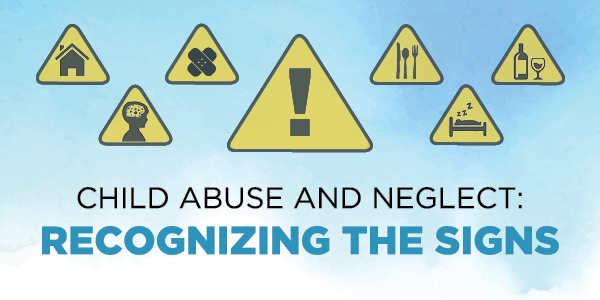Recognizing the Signs of Child Abuse and Neglect

(This article is part of a series for National Child Abuse Prevention Month. Be sure to check out these related posts: “Child Abuse and Neglect – What You Need to Know” and “Fact or Fiction – What is True About Child Abuse?”)
Child abuse is an epidemic that can happen anywhere and to anyone. It occurs in several different forms including physical, emotional, verbal or mental abuse, sexual assault or neglect. Everyone has a role to play in ensuring children are safe and protected. We encourage family members, neighbors, educators, caregivers and entire communities to recognize the signs below and report if a child is being abused or neglected. You can also download this one-page sheet with all the signs to help you recognize child abuse and neglect.
Signs of Child Abuse and Neglect:
 Unexplained injuries
Unexplained injuries
Burns, cuts and bruises are visible signs of physical abuse. Explanations for these injuries may be unconvincing.

Changes in behavior
Abused children often appear anxious, aggressive, depressed, withdrawn or scared. Some may return to earlier behaviors such as wetting the bed or express an irrational fear of strangers or the dark.
 Fear of going home
Fear of going home
Abused children may display anxiety about leaving school or going somewhere alone with the abuser.
 Changes in eating
Changes in eating
Fear and stress can alter an abused child’s eating habits, resulting in gaining or losing weight.
 Changes in sleeping
Changes in sleeping
Abused children may appear tired, have difficulty sleeping or experience frequent nightmares.
 Changes in school performance
Changes in school performance
Abused children have difficulty concentrating and have frequent absences that can often be attributed to parents trying to hide the child’s injuries.
 Lack of personal care or hygiene
Lack of personal care or hygiene
Abused and neglected children may appear dirty, uncared for and lack suitable clothing for the weather.
 Risk-taking behaviors
Risk-taking behaviors
Older youth who have experienced abuse may begin experimenting with drugs or alcohol.
 Inappropriate behaviors
Inappropriate behaviors
Children who have been sexually abused may display sexual behavior or explicit language.
If you suspect a child is being abused or neglected, call 1-800-4-A-CHILD.
KVC works to prevent and heal child abuse and neglect in multiple states and provides services for children and families is crisis including in-home family therapy (family preservation), foster family support, adoption and more. We invite you to join us in this work by becoming foster or adoptive parent, volunteering, or donating.
Related articles:





